What is the value of a 1938 penny? Why are coins from 1938 known as “Lincoln Wheat Pennies”? These questions and more will be answered in this article.
So, if you are a coin collector or want to learn more about coin history and value, read on for additional information about the 1938 Lincoln Wheat Penny!
What Is the 1938 Lincoln Penny Made Of?
The Lincoln Wheat Penny was designed by Victor David Brenner, an American sculptor, medalist, and engraver. The Wheat Penny has a face value of $0.01 (one cent) and a metal composition of 95% Copper and 5% Tin and Zinc. It has a plain edge, a diameter of 19.00 millimeters, and weighs 3.11 grams. According to reports from USA Coin Book, this particular Wheat Penny may be valued between $0.22 to $3.30 in circulated condition.
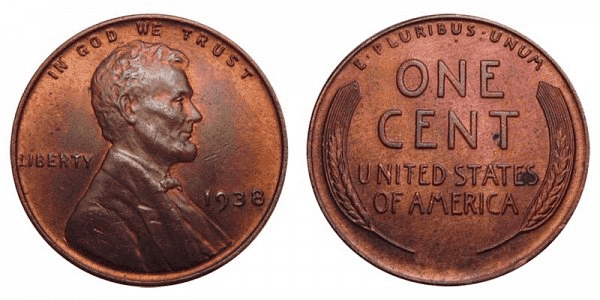
The 1938 Lincoln Wheat Penny’s obverse features a lawyer, politician, and statesman, Abraham Lincoln. Still, he is more commonly known as the 16th president of the United States of America from 1861 until he was assassinated in 1865.
Arching above Lincoln’s profile, we can read the famous adage IN GOD WE TRUST near the coin’s top rim. The word LIBERTY is bolded on his left side. Meanwhile, the year of minting 1938 is written on his right.
The word ONE CENT is printed across the coin’s reverse, with the words UNITED STATES OF AMERICA below it. A pair of durum wheat ears can be seen framing the coin on both sides. These wheat ears are responsible for this coin’s famous moniker, “Wheat Penny.” The Latin phrase E PLURIBUS UNUM is arching above the rest of the design elements, which translates to “out of many, one.”
1938 Lincoln Wheat Pennies feature a mint mark directly beneath the year of minting. An “S” indicates that the coin was minted in San Francisco, while a “D” indicates that it was minted in Denver. 1938 Wheat Pennies struck in Philadelphia do not bear any mint marks.
1938 Lincoln Penny Varieties
Here is a summary of the Lincoln Wheat Penny varieties minted in 1938:
| Variety | Mint Location | Mintage |
| 1940 D Lincoln Wheat Penny | Denver | 20,010,000 |
| 1940 S Lincoln Wheat Penny | San Francisco | 15,180,000 |
| 1940 P Lincoln Wheat Penny | Philadelphia | 156,682,000 |
| 1940 Proof Lincoln Wheat Penny | Philadelphia | 14,734 |
| Total | 191,886,734 |
1938 D Lincoln Penny
Edge: Plain
Mint Mark: D
Place of minting: Denver
Year of minting: 1938
Face Value: $0.01 (one cent)
Price: $0.22 to $3.30 (circulated condition)
Quantity produced: 20,010,000
Designer: Victor David Brenner
Composition: 95% copper and 5% tin and zinc
Mass: 3.11 grams
Diameter: 19.00 mm
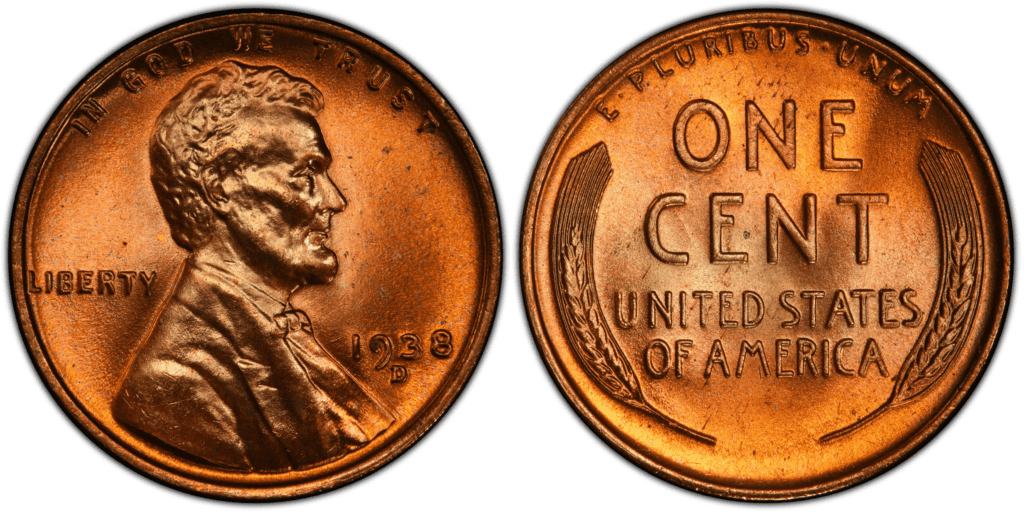
The 1938 D Lincoln Wheat Penny is quite well produced, and Mint State specimens are nearly invariably crisply struck from dies with minimal signs of wear. Fully red gems are marginally more unusual than the majority of late 1930s cents, but not by enough to qualify as rare.
The USA Coin Book estimates the value of a 1938 D Lincoln Wheat Penny at $0.33 in Average Condition. It can be worth up to $10 or more in Uncirculated (MS+) Mint Condition.
1938 P Lincoln Penny
Edge: Plain
Mint Mark: P
Place of minting: Philadelphia
Year of minting: 1938
Face Value: $0.01 (one cent)
Price: $0.17 to $2.28 (circulated condition)
Quantity produced: 156,682,000
Designer: Victor David Brenner
Composition: 95% copper and 5% tin and zinc
Mass: 3.11 grams
Diameter: 19.00 mm
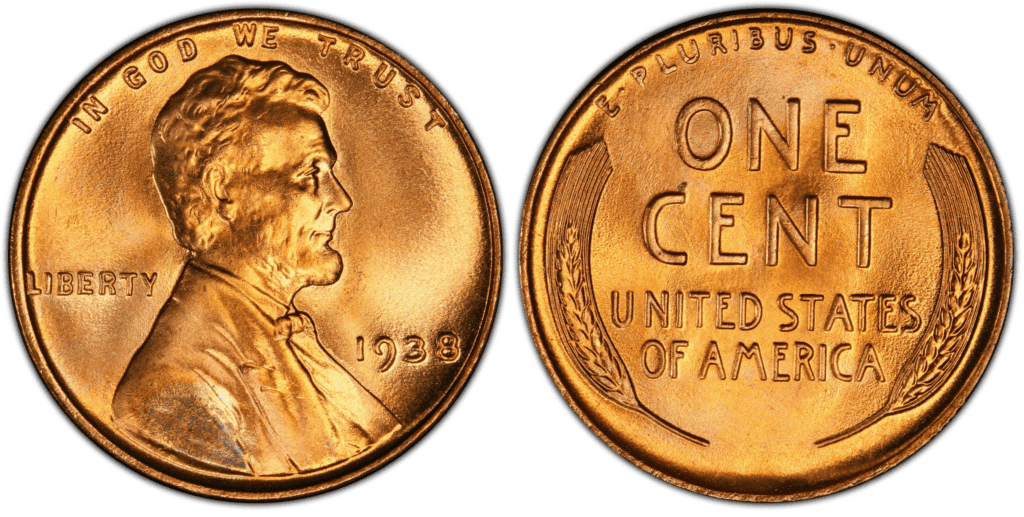
In 1938, the United States suffered a setback from the economic recovery phase of 1933–36. As a result, coin manufacturing fell that year.
The Philadelphia Mint produced slightly over half as many pennies as it had in 1937. This issue’s rolls were conserved sufficiently to make it almost as common as nearby dates, but Mint State grades have always cost more.
According to the USA Coin Book, a Lincoln Wheat Penny from 1938 in Average Condition can be worth $0.22. If you have one in Uncirculated (MS+) Mint Condition, you can sell it for as much as $4.52 to $10. Proof Coins for this particular issue can be worth $67 or even more!
1938 S Lincoln Penny
Edge: Plain
Mint Mark: S
Place of minting: San Francisco
Year of minting: 1938
Face Value: $0.01 (one cent)
Price: $0.45 to $3.30 (circulated condition)
Quantity produced: 156,682,000
Designer: Victor David Brenner
Composition: 95% copper and 5% tin and zinc
Mass: 3.11 grams
Diameter: 19.00 mm
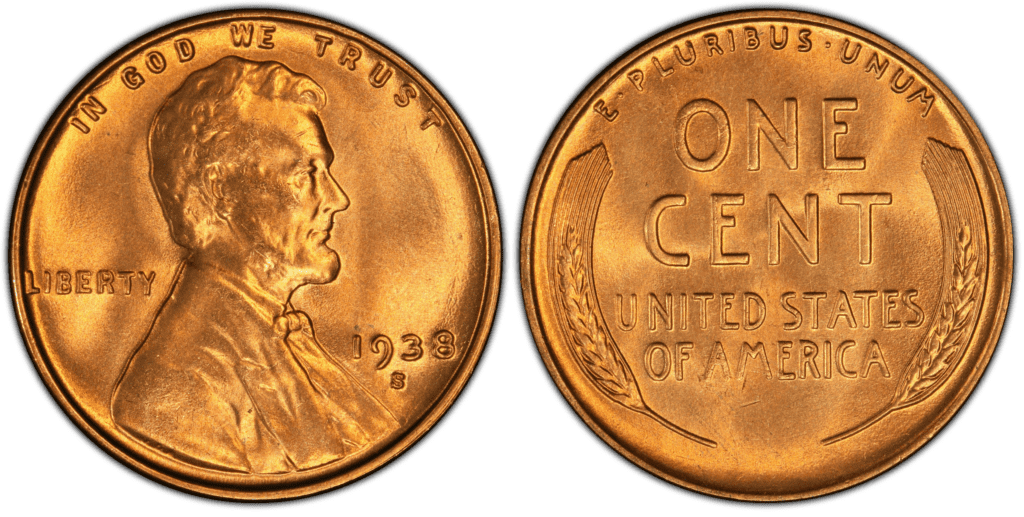
The 1938 S Lincoln Wheat Penny’s limited mintage made it somewhat difficult to find in circulation. However, it also drew investors who set away BU rolls at or close to the time of minting. As a result, there are enough fully red gems left over to satisfy seasoned collectors.
Due to the United States slowing economy, the 1938 S Lincoln Wheat Penny was only occasionally struck, with most coins being produced between the start and close of that year. The fact that most weren’t made available until the following year only encouraged hoarding.
For the 1938 S Lincoln Wheat Penny, two magnificent repunched mintmark variations exist. Though FS-501 is noticeably harder to find than FS-502, both are heavily gathered as a series member.
A 1938 S Lincoln Wheat Penny can be worth $0.56 in Average Condition (USA Coin Book). In Uncirculated (MS+) Mint Condition, this particular issue’s value can reach up to $4.52 to $9.13 or more.
1938 Proof Lincoln Wheat Penny
Edge: Plain
Mint Mark: no mint mark
Place of minting: Philadelphia
Year of minting: 1938
Face Value: $0.01 (one cent)
Price: $0.45 to $3.30 (circulated condition)
Quantity produced: 14,734
Designer: Victor David Brenner
Composition: 95% copper and 5% tin and zinc
Mass: 3.11 grams
Diameter: 19.00 mm
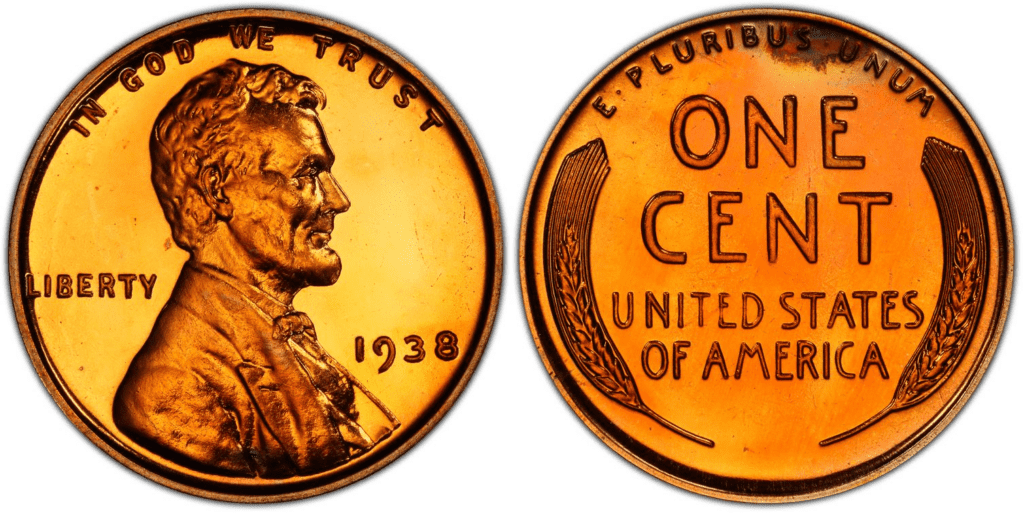
The 1938 proof penny differs from the rest of the 1938 penny varieties. Proof coins are usually more beautiful and attractive because they are specially made. They are polished by hand and struck more deeply. As a result, it can be very time-consuming to produce proof coins. That explains why just about 14 thousand proof pennies were produced in 1938.
The Philadelphia Mint produced proof coins in 1938 and didn’t put any mint mark on every coin they produced. Aside from that, proof coins are made for collectors and not for the general public.
List Of 1938 Lincoln Penny Errors
Coins become unique because of errors. As a result, they are substantially more expensive to buy than their standard equivalents. Below, you will discover some of the more common coin errors from the 1938 Lincoln Wheat Penny mintage.
Clipped Planchet Error
When the die clips the coin edge before it is ejected, the result is a clipped planchet error.
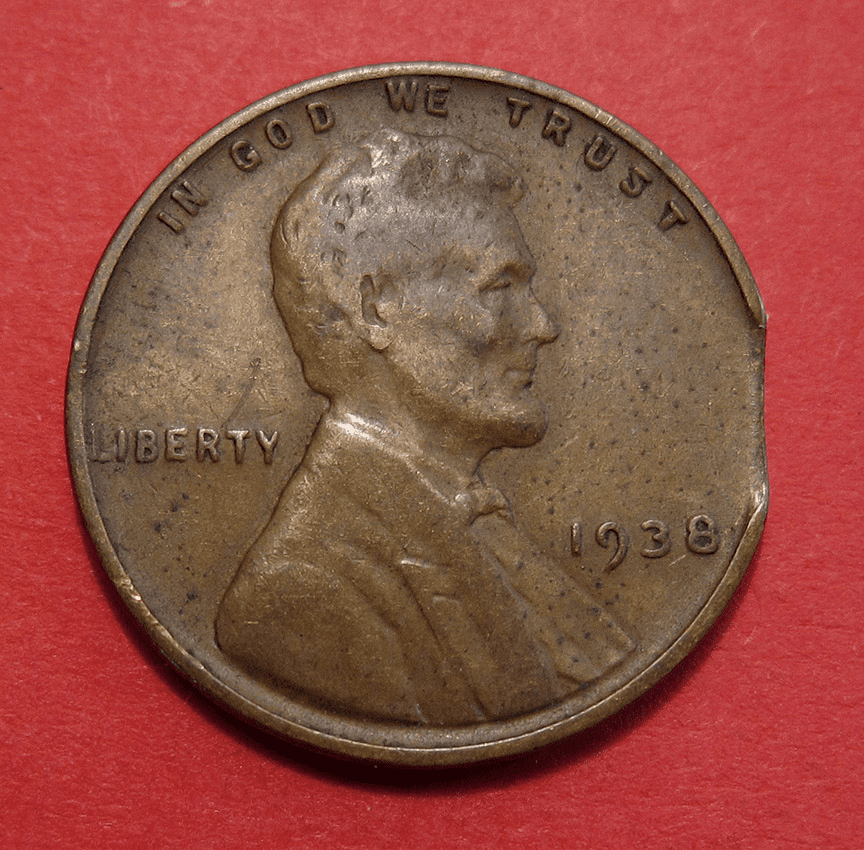
Lamination Error
A lamination error develops when the exterior coin coat is damaged during the minting process.
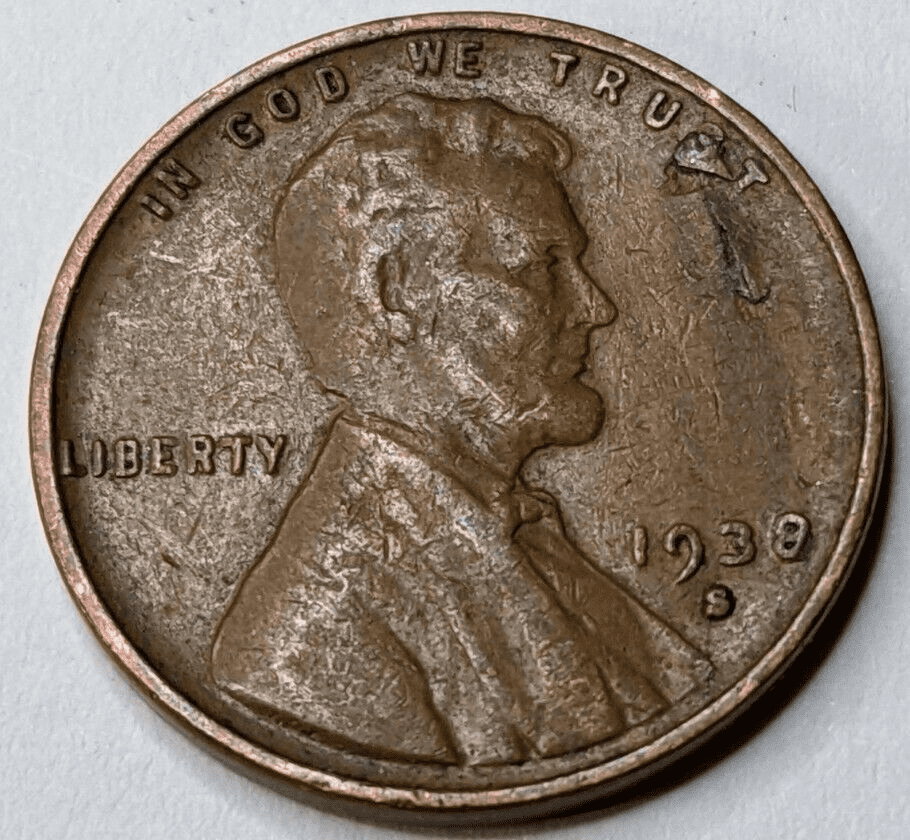
Doubled Die Error
When the die moves while the coin is being hubbed, a doubled die mistake happens. Some features consequently frequently overlap or cast shadows on one another.
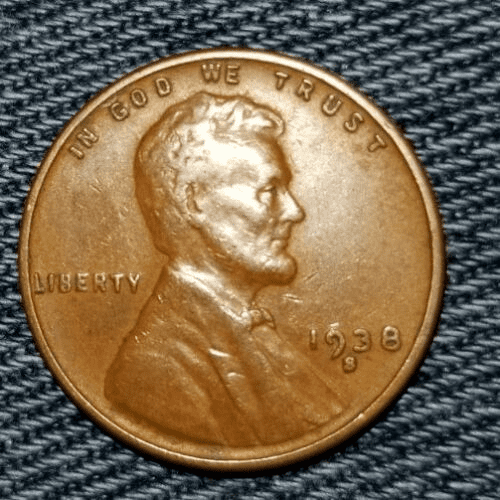
Cud Mark Error
A cud on a coin is an imperfection that resembles a glob on the coin’s surface. The device or inscription is removed from the field by raising the cud. Severe die fractures or cracks in the die cause cuds.
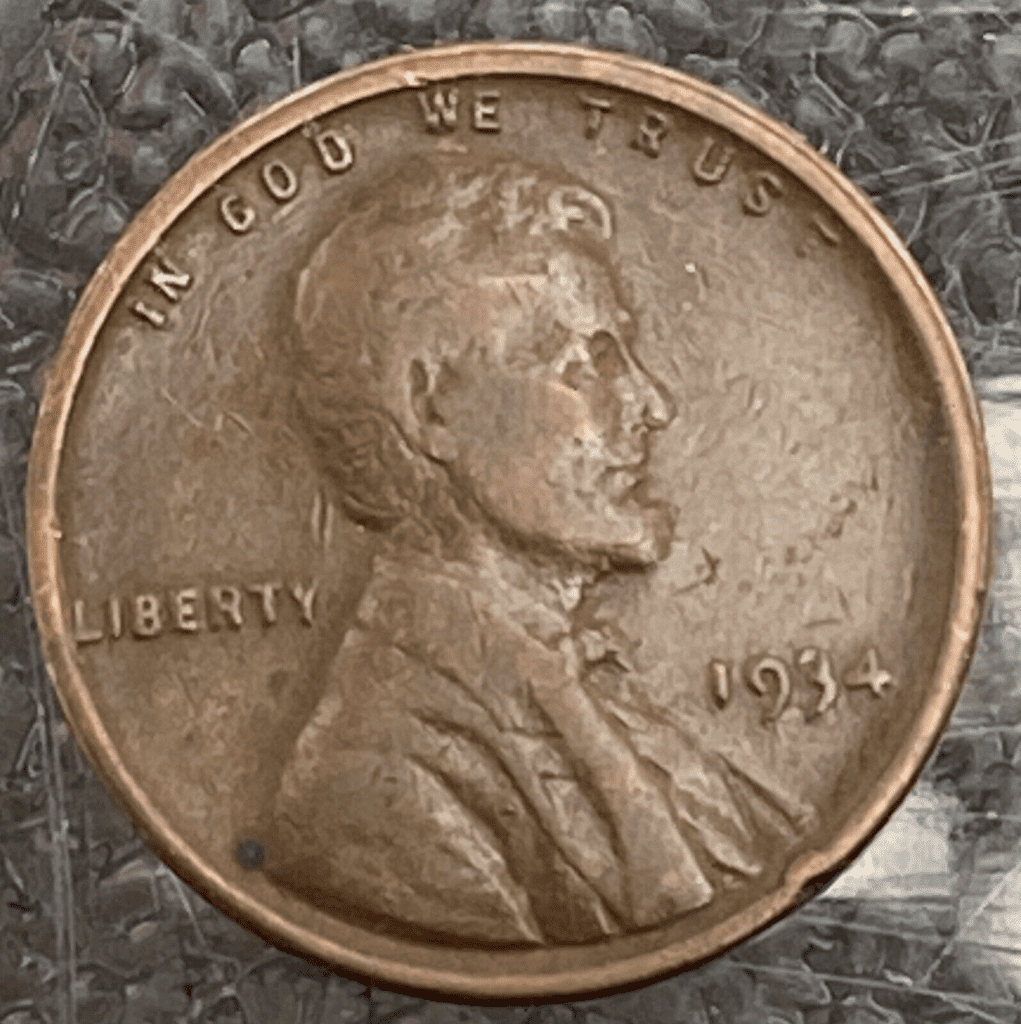
Repunched Mint Mark (RPM) Error
When the letter punch used to place the mintmark into the working die leaves two or more offset imprints, the result is a repunched mintmark variant. The impressions overlap almost always. A completely unique secondary mintmark is exceptionally rare.
How Much Is the 1938 Lincoln Penny Worth Today?
The face value of a 1938 Lincoln Wheat Penny is $0.01 (one cent). According to reports from USA Coin Book, this particular Wheat Penny may be valued at $10 or more in Uncirculated (MS+) Mint Condition. Proof Coins for the 1938 Lincoln Wheat Penny can be worth $67 or even more!
To know the earning potential for this coin, here’s a 1938 Lincoln Penny values chart of the auction records for each variety:
| Coin | Condition | Grade | Sold date | Sold by | Value |
| 1938 Proof Lincoln Penny | Superb Gem Uncirculated | PR 68 (Cameo) | November 18, 2020 | Stack’s Bowers | $14,400
|
| 1938 P Lincoln Penny | Superb Gem Uncirculated | MS 68 (Red) | November 7, 2005 | Heritage Auctions | $6,325 |
| 1938 D Lincoln Penny | Superb Gem Uncirculated | MS 68 | January 1, 2007 | Heritage Auctions | $4,313 |
| 1938 P Lincoln Penny | Superb Gem Uncirculated | MS 67+ | July 10, 2014 | Heritage Auctions | $2,115 |
How Coins are Graded
The Sheldon Scale is used by numismatists to provide a numerical value to coins. The Sheldon Scale goes from poor (P-1) to perfect mint state (P-1) (MS-70). Coins were originally evaluated using words to reflect their condition (Good, Fair, Excellent, Etc.). Unfortunately, coin collectors and dealers had different ideas about what each of these terms represent.
Professional numismatists joined together in the 1970s and established CoinGrading standards. These numismatists now assign grades at key places on the seventy-point scale, using the most regularly utilized numeric points in conjunction with the original adjective grade. The following are the most common coin grades:
- (P-1) Poor – Indistinguishable and probably damaged; if used, must have a date and mintmark; otherwise, rather battered.
- (FR-2) Fair – Nearly smooth, but without the damage that a coin graded Poor often possesses. The coin must have enough detail to be identified.
- (G-4) Fair – Inscriptions have merged into the rims in some areas, and important elements have been mostly erased.
- (VG-8) Very Good- A little weathered, but all of the primary design elements are visible, albeit faintly. There is little if any, central detail left.
- (F-12) Good – The item is very worn, yet the wear is even, and the overall design details stand out clearly. Rims are almost completely isolated from the field.
- (VF-20) Very Fine – Moderately weathered, with some finer features still visible. The motto or all letters of LIBERTY are readable. Both sides of the coin have entire rims that are separated from the field.
- (EF-40) Extremely Fine – Gently used; all gadgets are visible, and the most important ones are bold. The finer details are bold and clear, however, light wear may be seen.
- (AU-50) Uncirculated – Slight evidence of wear on the coin’s design’s high points; may have contact marks; eye appeal should be adequate.
- (AU-58) Uncirculated Choice – Slight traces of wear, no severe contact marks, almost full mint shine, and great eye appeal.
- (MS-60) Mint State Basal – Strictly uncirculated; no indication of wear on the coin’s highest points, but an unsightly coin with reduced luster, visible contact marks, hairlines, and other flaws.
- (MS-63) Mint State Acceptable – Uncirculated, but with contact scratches and nicks, little reduced shine, but otherwise appealing appearance. The strike is weak to average.
- (MS-65) Mint State Choice – Uncirculated with great mint shine, very little contact blemishes, and exceptional eye appeal. The strike is unusually severe.
- (MS-68) Mint State Premium Quality – Uncirculated with superb luster, no obvious contact marks to the naked eye, and exceptional eye appeal. The strike is quick and appealing.
- (MS-69) Almost Perfect Mint State – Uncirculated with perfect brilliance, a sharp and appealing strike, and extremely good eye appeal. A near-perfect coin with minor imperfections in the planchet, strike, and contact markings (seen only under 8x magnification).
- (MS-70) Mint State Perfect – Under 8x magnification, there are no tiny imperfections discernible; the strike is crisp, and the coin is perfectly centered on a beautiful planchet. Rarely seen on a coin, this coin is bright and whole, with original luster and exceptional eye appeal.
Where To Buy Or Sell 1938 Lincoln Penny?
Heading to online auctions and other online marketplaces is the most practical way to purchase or sell 1938 Lincoln Wheat Pennies. Most sellers place bids on online marketplaces like eBay, Etsy, Amazon, and Craigslist. However, you can sell or buy coins at coin or antique stores.
If you need guidance on where and how to buy or sell your 1938 Lincoln Wheat Pennies, it is best to tap on professional coin grading service providers from PCGS and NGC for assistance.
FAQs
What makes a 1938 wheat penny valuable?
Coins become unique because of errors, so they are substantially more valuable than their standard equivalents. As such, as a coin enthusiast, you should consider collecting coin errors from the 1938 Lincoln Wheat Penny mintage because of their value.
How much is a 1938 penny worth today?
The face value of a 1938 Lincoln Wheat Penny is $0.01 (one cent). According to reports from USA Coin Book, this particular Wheat Penny may be valued at $10 or more in Uncirculated (MS+) Mint Condition. Proof Coins for the 1938 Lincoln Wheat Penny can be worth $67 or even more!
How much is a 1938 wheat penny with no mint mark worth?
The coins minted from Philadelphia do not bear any mint mark. In Average Condition, a 1938 Lincoln Wheat Penny from the Philadelphia Mint can be worth $0.22 (USA Coin Book). If you have one in Uncirculated (MS+) Mint Condition, you can sell it for as much as $4.52 to $10. Proof Coins for this particular issue can be worth $67 or even more. The auction record for the 1938 no-mint mark penny at the time of this writing is $6,325.
